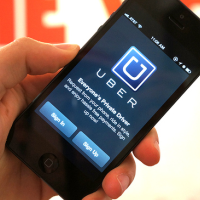S.F. Cabbies’ Database Feeds Insurance Companies and CHP Info about Startup Competition

The San Francisco Cab Drivers Association (SFCDA) is combating smartphone-assisted startups that are cutting into their business, like Uber, Lyft and Sidecar, by using a little technology themselves to reach out and share their services with others.
Taxi drivers in the association have been taking photographs, writing down license plate numbers and gathering other information about the startup drivers, who are using their own vehicles to tote passengers around, and compiling it in a searchable online database. Access to the information is given to member companies of the “Personal Insurance Federation, the San Francisco MTA, the California Highway Patrol (CHP) and the California Public Utilities Safety Enforcement Division,” according to the form used for reporting drivers.
SFCDA board member Trevor Johnson told the San Francisco Business Times the database currently holds 3,000 entries. It remains to be seen how insurance companies are going to feel about paying personal claims for drivers hauling passengers around, but the database could accelerate the process.
San Francisco is ground zero for the clash of taxicab cultures, as the newbies compete using less expensive business models. One of those efficiencies, until recently, was not providing auto insurance for their armies of civilian drivers.
The California Public Utilities Commission (PUC) changed that last September when it issued a framework for regulating the new businesses, and gave them a name: Transportation Network Companies, henceforth known as TNCs. Among the new regulations was a requirement that each TNC carry liability insurance policies of $1 million per incident, but unlike other states, California does not require drivers to carry commercial insurance.
The companies protested that they were just makers of smartphone apps, not taxicab outfits, but they acquiesced to a deal that allows their insurance costs to be lower than their old-school competition. TNC drivers were duly warned by the California Department of Insurance of the policy shortcomings.
Now, potential victims are finding out after an Uber driver struck three pedestrians in a crosswalk on New Year’s Eve, killing 6-year-old Sophia Liu. The driver was between runs and Uber has claimed no liability for the accident, citing a provision in the PUC regulations that they only applied while the vehicle was being used for work. The courts may comment on that.
“It’s ridiculous to say that they’re only insured when they’re on a call,” cabbie association President Barry Korengold told CBS San Francisco. “Taxi cabs have to be insured 100 percent of the time. They don’t just disappear when they’re not on a call. They’re still out there on the road, as demonstrated by this accident, causing a danger to the public.”
The PUC is still working on TNC regulations, even as the industry quickly evolves. Fortune reporter JP Mangalindan cited unconfirmed association numbers that 2,800 of its 8,500 drivers had gone over to the other side in the last 12 months. Anecdotal evidence points to higher take-home pay among the TNC contractors.
And after years of squeezing consumers to the benefit of existing taxicab companies and drivers, the San Francisco Municipal Transportation Agency (SFMTA) increased the number of permits to drive cabs in the area from 1,500 to 1,900 last year. That will grow to 2,100 by the end of the year.
Meanwhile, every day seems to bring some new twist in the unfolding saga of San Francisco transportation, as the city accommodates its growing population of demanding, upscale technologically-oriented residents.
–Ken Broder
To Learn More:
Cabbies Give Insurance Firms License Data on Citizen Competitors (by Patrick Hoge, San Francisco Business Times)
San Francisco Cab Drivers Are Uber’s Latest Pickup (by JP Mangalindan, Fortune)
Uber’s Denial Of Liability in Girl’s Death Raises Accident Accountability Questions (by Josh Constine, TechCruch)
SF Taxi Association Wants Stricter Rideshare Service Rules after Deadly Accident (by Doug Sovern, CBS San Francisco)
Notice to Transportation Network Company Drivers (California Department of Insurance)
PUC Says UberX and Others Are Legal, but Don’t Call It “Ride-Sharing” (by Ken Broder, AllGov California)
- Top Stories
- Controversies
- Where is the Money Going?
- California and the Nation
- Appointments and Resignations
- Unusual News
- Latest News
- California Forbids U.S. Immigration Agents from Pretending to be Police
- California Lawmakers Urged to Strip “Self-Dealing” Tax Board of Its Duties
- Big Oil’s Grip on California
- Santa Cruz Police See Homeland Security Betrayal in Use of Gang Roundup as Cover for Immigration Raid
- Oil Companies Face Deadline to Stop Polluting California Groundwater





